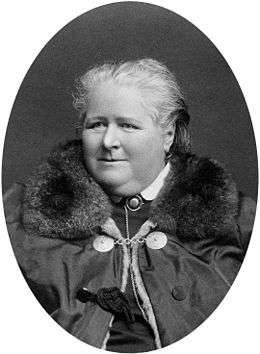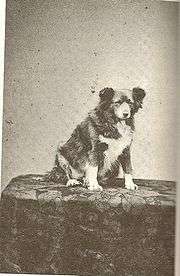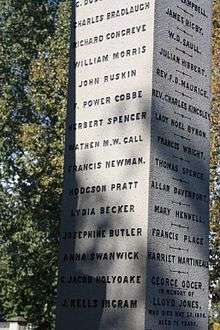Frances Power Cobbe
Frances Power Cobbe (4 December 1822 – 5 April 1904) was an Irish writer, social reformer, anti-vivisection activist and leading women's suffrage campaigner. She founded a number of animal advocacy groups, including the National Anti-Vivisection Society (NAVS) in 1875 and the British Union for the Abolition of Vivisection (BUAV) in 1898, and was a member of the executive council of the London National Society for Women's Suffrage.
Frances Power Cobbe | |
|---|---|
 Photograph from Life of Frances Power Cobbe, 1894 | |
| Born | 4 December 1822 Newbridge House, Donabate, Co. Dublin, Ireland |
| Died | 5 April 1904 (aged 81) Hengwrt, Wales |
| Nationality | Irish |
| Occupation | Writer, social reformer |
| Known for | Founder of the Society for the Protection of Animals Liable to Vivisection (1875); British Union for the Abolition of Vivisection (1898); member of the executive council of the London National Society for Women's Suffrage |
She was the author of a number of books and essays, including The Intuitive Theory of Morals (1855), On the Pursuits of Women (1863), Cities of the Past (1864), Criminals, Idiots, Women and Minors (1869), Darwinism in Morals (1871) and Scientific Spirit of the Age (1888).
Life

Frances Power Cobbe was a member of the prominent Cobbe family, descended from Archbishop Charles Cobbe, Primate of Ireland. She was born in Newbridge House in the family estate in what is now Donabate, Co. Dublin.[1]
Cobbe worked at the Red Lodge Reformatory and lived with the owner, Mary Carpenter, from 1858 to 1859, but a turbulent relationship between the two meant that Cobbe left the school and moved out.[2]
Cobbe formed a lesbian relationship with the Welsh sculptor Mary Lloyd (1819-c. 1896),[3][4] whom she met in Rome in 1861 and lived with from 1864 until Lloyd's death. That death, in 1896, affected Cobbe badly. Her friend, the writer Blanche Atkinson, writing, “The sorrow of Miss Lloyd’s death changed the whole aspect of existence for Miss Cobbe. The joy of life had gone. It had been such a friendship as is rarely seen – perfect in love, sympathy, and mutual understand.” [5] Around 1891 and in danger of losing their home at Hengwrt, in which Lloyd had inherited a share on the death of her parents, the couple were relieved by a legacy of over £25,000 from the widow of Richard Vaughan Yates.[6] They are buried together at Saint Illtud Church Cemetery, Llanelltyd, Gwynedd, Wales.[7] In letters and published writing, Cobbe referred to Lloyd alternately as "husband," "wife," and "dear friend."[8]
Cobbe founded the Society for the Protection of Animals Liable to Vivisection (SPALV) in 1875, the world's first organisation campaigning against animal experiments, and in 1898 the BUAV, two groups that remain active. She was a member of the executive council of the London National Society for Women's Suffrage and writer of editorial columns for London newspapers on suffrage, property rights for women and opposition to vivisection. Around 1880, with Louise Twining, she founded Homes for Workhouse Girls.[9]

Cobbe met the Darwin family during 1868. Emma Darwin liked her, "Miss Cobbe was very agreeable." Cobbe persuaded Charles Darwin to read Immanuel Kant's Metaphysics of Ethics.[10] She met him again during 1869 in Wales, and apparently interrupted him when he was quite ill,[11] and tried to persuade him to read John Stuart Mill—and indeed Darwin had read Cobbe's review of Mill's book, The Subjection of Women.[12] She then lost his trust when without permission she edited and published a letter he'd written to her.[11] Her critique of Darwin's Descent of Man, Darwinism in Morals was published in The Theological Review in April 1871.[13][14]
Cobbe's activism for women's rights included advocating for women to be allowed to take university examinations and therefore earn a degree at Oxford and Cambridge. She presented a paper at the Social Science Congress in 1862 to argue the issue [15]
Posthumous recognition
A portrait of her is included in a mural by Walter P. Starmer unveiled in 1921 in the church of St Jude-on-the-Hill in Hampstead Garden Suburb, London.[16]
Her name and picture (and those of 58 other women's suffrage supporters) are on the plinth of the statue of Millicent Fawcett in Parliament Square, London, unveiled in 2018.[17][18][19]
Her name is listed on the south face of the Reformers Memorial in Kensal Green Cemetery in London.
The Animal Theology professorship at the Graduate Theological Foundation is named after Cobbe.[20]
References
- Cobbe, Frances Power, with Blanche Atkinson (1904). Life of Frances Power Cobbe as told by herself. London: S. Sonnenschein & co. p. 74.CS1 maint: multiple names: authors list (link)
- Saywell, R J, Mary Carpenter of Bristol, The University of Bristol, 1964 (2001 reprint)
- Zimmerman, Bonnie, ed. (2013). Encyclopedia of Lesbian Histories and Cultures. Routledge. ISBN 9781136787508.
- Legget, Jane (1988). Local heroines: a women's history gazetteer of England, Scotland and Wales. Pandora. p. 50.
- Shopland, Norena 'Frances and Mary' from Forbidden Lives: LGBT stories from Wales Seren Books (2017)
- Mitchell, Sally (2004). Frances Power Cobbe: Victorian Feminist, Journalist, Reformer. University of Virginia Press. pp. 144, 335. ISBN 9780813922713.
- Mitchell, Sally (2004). Frances Power Cobbe: Victorian Feminist, Journalist, Reformer. University of Virginia Press. pp. 139–147. ISBN 9780813922713.
- Marcus, Sharon (10 July 2009). Between Women: Friendship, Desire, and Marriage in Victorian England. ISBN 978-1400830855. Retrieved 13 August 2012.
- Yeo, Eileen Janes (1992) Social motherhood and the sexual communion of labour in British Social Science, 1850-1950, Women's History Review, 1:1, 63-87, DOI: https://dx.doi.org/10.1080/09612029200200003
- Browne, Janet (2002). Charles Darwin: The Power of Place. Alfred A. Knopf. pp. 296–297. ISBN 978-0-679-42932-6.
- Browne, Janet (2002). Charles Darwin: The Power of Place. Alfred A. Knopf. p. 332. ISBN 978-0-679-42932-6.
- Adrian Desmond and James Moore, "Introduction", in (2004). The Descent of Man, and Selection in Relation to Sex (2 ed.). London: Penguin Classics. pp. xivii. ISBN 978-0-14-043631-0.CS1 maint: multiple names: authors list (link)
- Cobbe, Frances Power (April 1871), "Darwinism in Morals", The Theological Review, Williams & Norgate, 8: 167–192
- "Darwinism in morals : and other essays. Reprinted from the Theological and Fortnightly reviews, Fraser's and Macmillan's magazines, and the Manchester friend : Cobbe, Frances Power, 1822-1904 : Free Download & Streaming : Internet Archive". Retrieved 10 December 2016.
- Lynn McDonald, ed. 1998 Women Theorists on Society and Politics Wilfrid Laurier university Press, Waterloo, Ontario, Canada ISBN 0-88920-290-7
- Walker, Alan (31 July 2015). "Campaign from on high at St Jude's". Church Times. Retrieved 9 February 2020.
- "Historic statue of suffragist leader Millicent Fawcett unveiled in Parliament Square". Gov.uk. 24 April 2018. Retrieved 24 April 2018.
- Topping, Alexandra (24 April 2018). "First statue of a woman in Parliament Square unveiled". The Guardian. Retrieved 24 April 2018.
- "Millicent Fawcett statue unveiling: the women and men whose names will be on the plinth". iNews. 24 April 2018. Retrieved 25 April 2018.
- "Press Release: First Professor of Animal Theology in the US". Oxford Centre for Animal Ethics. 10 March 2020. Retrieved 10 July 2020.
Further reading
- Frances Power Cobbe, The Modern Rack: Papers on Vivisection. London: Swan Sonnenschein, 1889.
- Buettinger, Craig. "Women and antivivisection in late nineteenth century America", Journal of Social History, Vol. 30, No. 4 (Summer, 1997), pp. 857–872.
- Caine, Barbara. Victorian feminists. Oxford 1992
- Hamilton, Susan. Frances Power Cobbe and Victorian Feminism. Palgrave Macmillan, 2006.
- Rakow, Lana and Kramarae, Cheris. The Revolution in Words: Women's Source Library. London, Routledge 2003 ISBN 0-415-25689-5
- Lori Williamson, Power and protest : Frances Power Cobbe and Victorian society. 2005. ISBN 978-1-85489-100-6. A 320-page biography.
- Victorian feminist, social reformer and anti-vivisectionist, discussion on BBC Radio 4's Woman's Hour, 27 June 2005
- State University of New York – Frances Power Cobbe (1822–1904)
- The archives of the British Union for the Abolition of Vivisection (ref U DBV) are held at the Hull History Centre. Details of holdings are on its online catalogue.
External links
| Wikiquote has quotations related to: Frances Power Cobbe |
| Wikimedia Commons has media related to Frances Power Cobbe. |
- Works by Frances Power Cobbe at Project Gutenberg
- Works by or about Frances Power Cobbe in libraries (WorldCat catalog)
- Frances Power Cobbe archives at the National Library of Wales
